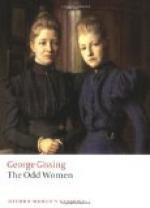This Monday morning, among letters delivered at the house, was one from the strayed girl. Miss Barfoot read it in private, and throughout the day remained unusually grave. At five o’clock, when staff and pupils had all departed, she sat for a while in meditation, then spoke to Rhoda, who was glancing over a book by the window.
‘Here’s a letter I should like you to read.’
‘Something that has been troubling you since morning, isn’t it?’
‘Yes.’
Rhoda took the sheet and quickly ran through its contents. Her face hardened, and she threw down the letter with a smile of contempt.
‘What do you advise?’ asked the elder woman, closely observing her.
‘An answer in two lines—with a cheque enclosed, if you see fit.’
‘Does that really meet the case?’
‘More than meets it, I should say.’
Miss Barfoot pondered.
’I am doubtful. That is a letter of despair, and I can’t close my ears to it.’
’You had an affection for the girl. Help her, by all means, if you feel compelled to. But you would hardly dream of taking her back again?’
‘That’s the point. Why shouldn’t I?’
‘For one thing,’ replied Rhoda, looking coldly down upon her friend, ’you will never do any good with her. For another, she isn’t a suitable companion for the girls she would meet here.’
’I can’t be sure of either objection. She acted with deplorable rashness, with infatuation, but I never discovered any sign of evil in her. Did you?’
’Evil? Well, what does the word mean? I am not a Puritan, and I don’t judge her as the ordinary woman would. But I think she has put herself altogether beyond our sympathy. She was twenty-two years old—no child—and she acted with her eyes open. No deceit was practised with her. She knew the man had a wife, and she was base enough to accept a share of his attentions. Do you advocate polygamy? That is an intelligible position, I admit. It is one way of meeting the social difficulty. But not mine.’




